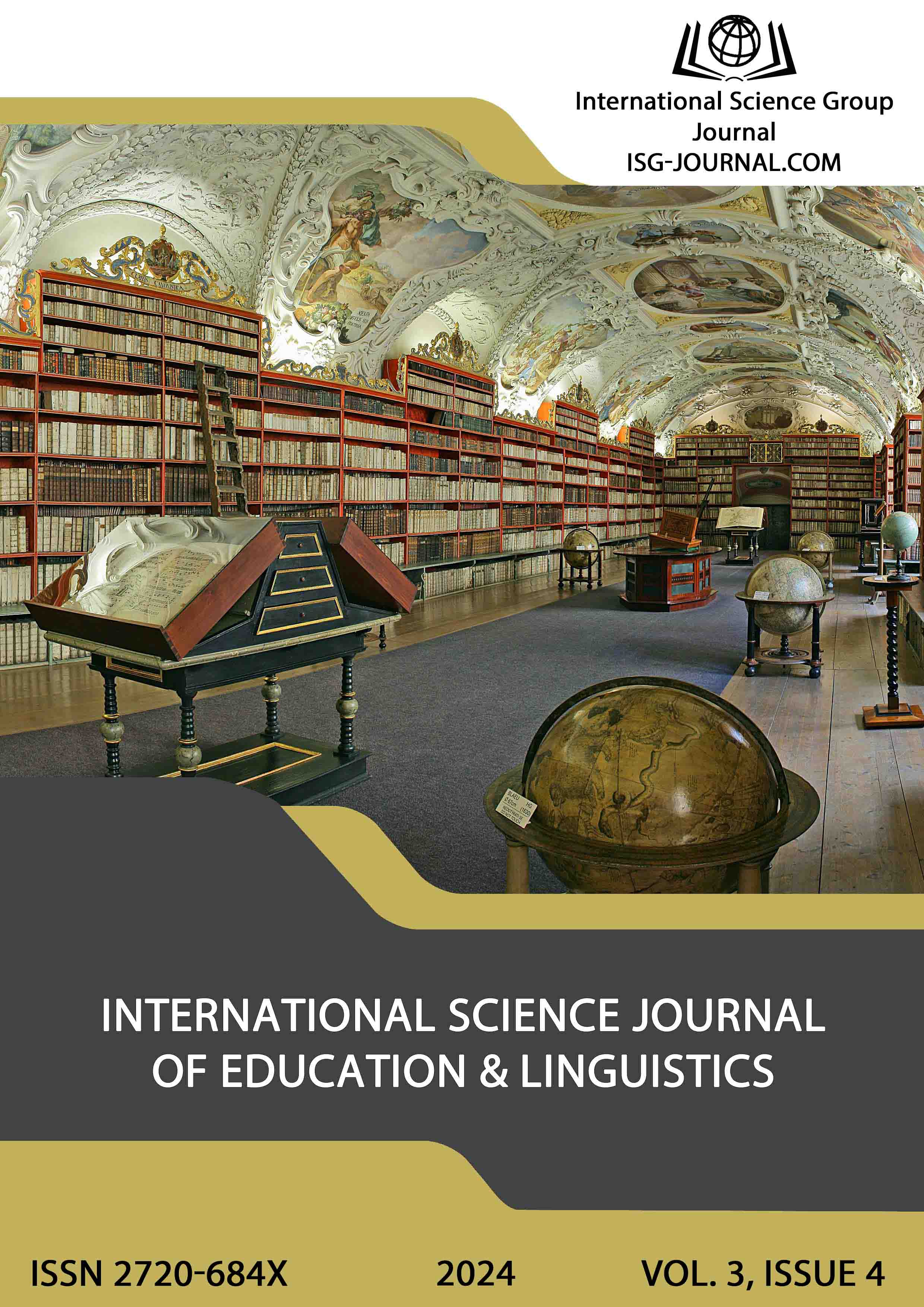Practical aspects of the independent work of the accompanist
DOI:
https://doi.org/10.46299/j.isjel.20240304.01Keywords:
individual approach, accompanist, concertmaster activity, independent work, performing experienceAbstract
The content of the article is devoted to the study of the features of accompanist activity, namely the practical aspects of independent individual work. Due to the fact that research on the individual independent work of specialists in the art field, namely accompaniment, is not enough, the author of the article, on the basis of his own experience and performing practice, outlined and described practical recommendations for accompanists in independent work on the study of a musical work. The article reveals important aspects of the work of the accompanist. The personal qualities, abilities and skills that an accompanist must have for full-fledged professional activity are described. The article highlights the main components of the individual independent work of the accompanist, techniques and methods for improving his professional skills. A certain range of tasks and methods is outlined when working in a vocal class, a choral conducting class, with choral groups and instrumentalists. The main means of overcoming difficulties when working with musical works and texts are analyzed, namely a deep knowledge of the theory and history of music, pedagogy, psychology and musical performance, as well as the use of modern musical technologies. The article outlined and described the stages of the accompanist's independent work - learning and playing a musical work. His own method of studying the piano part is revealed. Seven stages of individual work were considered, each of which describes the sequence of actions and methods for improving the study of one’s own part, namely: familiarization with a piece of music; learning and playing in your own party; study of the soloist's part; playing with a soloist; joint performance of a piece of music; concert preparation and, in fact, concert performance of the program.References
Alekseiev A. (1974) From the history of piano pedagogy: Chrestomatiya. K.: Musical Ukraine, 161.
Boiko I. M. (2023). The complex of musical, theoretical and pedagogical disciplines as an integral part of the further professional activity of the accompanist. Bulletin of Science and Education. Series «Pedagogy», № 5(11), 401–412.
Voropai N. (2008). Independent work of students as a means of individualizing their learning. Bulletin of the Precarpathian University. Pedagogy: collection of scientific works, № 24, 52–57.
Gusak V.A., Bai Yu. M. (2023) The essence of the performance agility of the game movements of the future instrumental teacher. Academic visions, № 25, 1-17.
Zorin V. V. (2018) Methodical aspects of the pianist-accompanist in the choreographic class. Scientific journal of the NPU named after M.P. Drahomanov. Series 5: Pedagogical Sciences: Realities and Prospects, № 65, 42–45.
Kasianenko L. O. (2003). The work of the pianist on the texture: A guide to the study of the performing interpretation of the texture of a piano work. K: NMAU, 168. http://dspace.pdpu.edu.ua/bitstream/123456789/13776/3/PIANIST.pdf
Koloskova Zh. (2019). The role of the accompanist in the process of training a choral conductor in the conditions of the art faculty. Scientific notes. Series «Pedagogical Sciences», № 138, 262–264.
Kotsyurba N.E. (2022). Features of the practical activity of the accompanist. Methodological recommendations for the independent and individual work of applicants for education of the educational component «Special class (piano)». Lutsk: Tower-Print, 20.
Molchanova T. O. (2007) The art of the pianist-accompanist: textbook. Persons. Lviv: DMA, 216.
Molchanova T. O. (2015) The art of pianist-accompanist in the cultural and historical context: history, theory, practice: Monograph. Lviv: Liga Press, 558. ISBN 978-966-397-282-7.
Radziwil T.A., Bai Yu. M., Boiko I. M. (2023) The health-saving competence of instrumentalists is an important condition for successful concert and performance activities. Scientific innovations and advanced technologies. Series «Pedagogy», № 11(25), 567–576.
Semko L.V. (2024) Features of professional training of instrumentalists-performers in the context of physiological, intellectual and psycho-emotional components. Science and Technology Today, № 4, 710–720.
Shymanskyi P. I., Havryliuk V. Ie., Tymozhynskyi V. A., Chepeliuk V. A. (2020). Forms and methods of independent work of the student on the choral score: teaching method. manual. For stud. mists. training. I-IV levels of accreditation special. 025 Musical Art. Lutsk: Tower-Print, 218.
Freiberg I. (2004) Der frühe italienische Generalbass dargestellt anhand der Quellen von 1595 bis 1655. 2 Bände (Bd 1: Traktate und Vorworte; Bd. 2: Notenbeispiele). Hildesheim: Olms. ISBN 3-487-12689-3 (Bd. 1), ISBN 3-487-12690-7 (Bd. 2).
Wilson A.J., Ahmad Ariffian B., Abu Zarin H. The Acquisition of Soft Skills in Real Estate Program via Industrial Training Procedia. Social and Behavioral Sciences. 2012. Vol. 65. N 3. P. 781-786 DOI: https://doi.org/10.1016/j.sbspro.2012.11.199.
Downloads
Published
How to Cite
Issue
Section
License
Copyright (c) 2024 Iryna Boіko

This work is licensed under a Creative Commons Attribution 4.0 International License.





